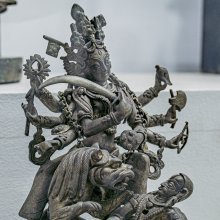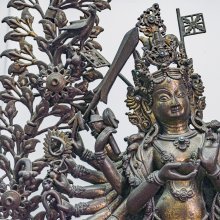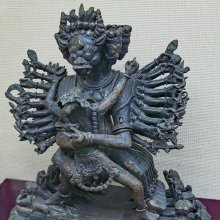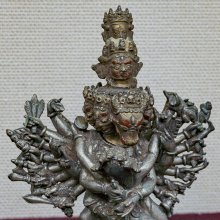Mahisha, Mahiṣa, Mahisa, Māhiṣa, Mahīśa: 38 definitions
Introduction:
Mahisha means something in Buddhism, Pali, Hinduism, Sanskrit, Marathi, Jainism, Prakrit, Hindi. If you want to know the exact meaning, history, etymology or English translation of this term then check out the descriptions on this page. Add your comment or reference to a book if you want to contribute to this summary article.
Mahisha has 37 English definitions available.
The Sanskrit terms Mahiṣa and Māhiṣa and Mahīśa can be transliterated into English as Mahisa or Mahisha, using the IAST transliteration scheme (?).
Alternative spellings of this word include Mahish.
Images (photo gallery)
(+6 more images available)
Languages of India and abroad
Sanskrit dictionary
[Deutsch Wörterbuch]
Source: Cologne Digital Sanskrit Dictionaries: Böhtlingk and Roth Grosses Petersburger WörterbuchMahiṣa (महिष):—
--- OR ---
Māhiṣa (माहिष):—(von mahiṣa und mahiṣī)
1) adj. f. ī dem Büffel —, der Büffelkuh eigen, von ihnen kommend [Pāṇini’s acht Bücher 4, 4, 48.] rūpa [Rāmāyaṇa 4, 9, 60.] [Mārkāṇḍeyapurāṇa 83, 20.] vapus [KĀŚĪKH. 72, 22.] veṣa [?27 (bei AUFRECHT, Halāyudha Ind.).] māṃsa [Mahābhārata.13, 4247.] śṛṅga [Amarakoṣa 2, 9, 100.] [Halāyudha 4, 79.] rakta [Oxforder Handschriften 103,b,8.] [Varāhamihira’s Bṛhajjātaka S. 55,30.] kṣīra [Manu’s Gesetzbuch 5, 9.] [YAMA] bei [Kullūka] zu [Manu’s Gesetzbuch 5, 8.] [Spr. 1388.] [Mārkāṇḍeyapurāṇa 32, 18.] [Suśruta 1, 174, 20. 176, 2.] ghṛta [?180, 19. Scholiast zu Kātyāyana’s Śrautasūtrāṇi 150, 13.] dadhi [Spr. 655.] pañca (gṛha; vgl. pañcamahiṣa) [Mārkāṇḍeyapurāṇa 50, 85.] —
2) m. pl. Nomen proprium eines Volkes [Varāhamihira’s Bṛhajjātaka S. 17, 26, v. l.] [Viṣṇupurāṇa 188,] [Nalopākhyāna 54.] sg. Nomen proprium einer Gegend [Oxforder Handschriften 339,b,16]; vgl. mahiṣa 2, b und māhiṣaka .
--- OR ---
Mahiṣa (महिष):—
2) c) von Skanda erschlagen [Mahābhārata 7, 7412.]
Source: Cologne Digital Sanskrit Dictionaries: Sanskrit-Wörterbuch in kürzerer FassungMahiṣa (महिष):——
1) Adj. (f. mahiṣī) gewaltig. suparṇa m. die Sonne , maga m. der Büffel. —
2) m. — a) Büffel. — b) ein grosser Priester (nach [Mahīdhara]). — c) Nomen proprium — α) Pl. eines Volkes. — β) eines Asura , den Durgā (oder Skanda) erschlägt. — γ) eines Sādhya. — δ) eines Mannes. — ε) eines Gebirges in Śālmaladvipa [Wilson's Uebersetzung des Viṣṇupurāṇa ,4,27.] —
3) f. māhiṣī — a) Büffelkuh. — b) Bez. ausgezeichneter Frauen , insbes. der ersten Gemahlin eines Fürsten (auch Pl. st. Sg.) ; auch Gemahlin eines Fürsten überh. und Weibchen (eines Vogels). sammudrasya Bez. der Yamuna. — c) *ein liederliches Weib und das Geld , welches man aus der Prostitution seines Weibes löst. — d) *eine best. Heilpflanze.
--- OR ---
Māhiṣa (माहिष):——
1) Adj. (f. ī) dem Büffel — , der Büffelkuh eigen , von ihnen kommend. —
2) m. Pl. Nomen proprium eines Volkes.
Sanskrit, also spelled संस्कृतम् (saṃskṛtam), is an ancient language of India commonly seen as the grandmother of the Indo-European language family (even English!). Closely allied with Prakrit and Pali, Sanskrit is more exhaustive in both grammar and terms and has the most extensive collection of literature in the world, greatly surpassing its sister-languages Greek and Latin.
See also (Relevant definitions)
Starts with (+37): Mahisamandala, Mahisha-kara, Mahishacara, Mahishada, Mahishadadhi, Mahishaddaka, Mahishadesha, Mahishadhvaja, Mahishadi, Mahishaga, Mahishaghni, Mahishaghrita, Mahishajya, Mahishaka, Mahishakanda, Mahishakhya, Mahishaksha, Mahishakshaka, Mahishakshi, Mahishakshi guggula.
Ends with: Adharmamahisha, Agramahisha, Ashvamahisha, Gomahisha, Nilamahisha, Nrimahisha, Pancamahisha, Pratimahisha, Sarvamahisha, Vanamahisha.
Full-text (+162): Mahishavahana, Mahishadhvaja, Mahishasura, Mahishaksha, Mahishardana, Mahishika, Mahishya, Mahishaghni, Mahishamardini, Mahishatva, Mahishamarddini, Mahishaka, Mahishapalaka, Mahishapala, Mahishanana, Ashvamahishika, Karambha, Mahishasthalaka, Shakyama, Mahishasthali.
Relevant text
Search found 57 books and stories containing Mahisha, Mahiṣa, Mahisa, Māhiṣa, Mahīśa, Mahīsa; (plurals include: Mahishas, Mahiṣas, Mahisas, Māhiṣas, Mahīśas, Mahīsas). You can also click to the full overview containing English textual excerpts. Below are direct links for the most relevant articles:
Manusmriti with the Commentary of Medhatithi (by Ganganatha Jha)
Verse 5.9 < [Section II - Objectionable Food]
Rig Veda (translation and commentary) (by H. H. Wilson)
Puranic encyclopaedia (by Vettam Mani)
Sripura (Archaeological Survey) (by Bikash Chandra Pradhan)
Stone Images (5): Sakta Images < [Chapter 3 - Sculptural Programme]
The Jataka tales [English], Volume 1-6 (by Robert Chalmers)
Jataka 278: Mahisa-jātaka < [Book III - Tika-Nipāta]
The Devi Bhagavata Purana (by Swami Vijñanananda)





